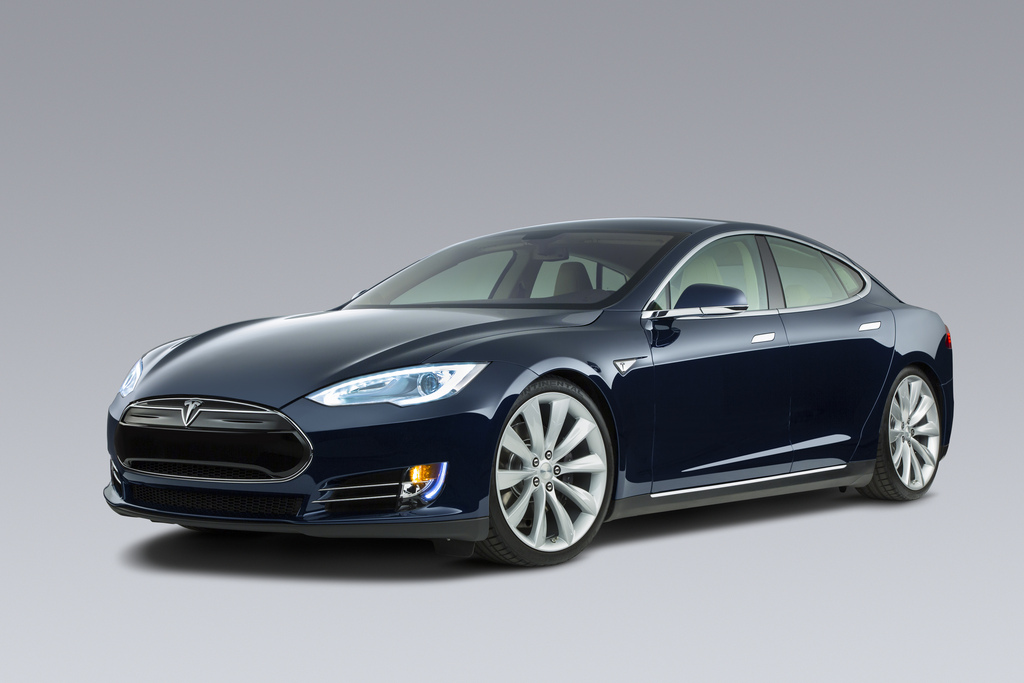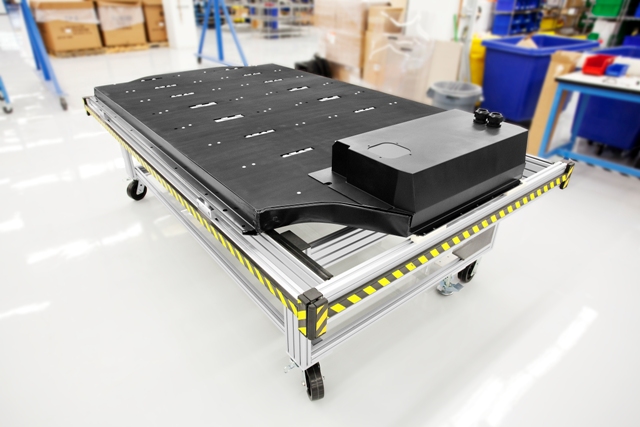
Date: 2024-12-21 Page is: DBtxt003.php txt00007057
Game Changers
Elon Musk - Tesla
What Goes Into A Tesla Model S Battery--And What It May Cost
Burgess COMMENTARY
Peter Burgess
What Goes Into A Tesla Model S Battery--And What It May Cost Reddit This! Share on Facebook Share on Twitter Tesla Motors - Model S lithium-ion battery packTesla Motors - Model S lithium-ion battery pack In his recent interview with Barron's, Tesla Motors CEO Elon Musk hung up on the reporter who was interviewing him. He said he had 'no interest in an article that debates what we consider to be an obvious point -- which is that there is a dramatic reduction in battery costs,' then went on to tell the reporter, 'You clearly do not understand the business,' before apologizing and ending the interview.
The resulting Barron's story argued that Tesla's stock price was overvalued, because the lithium-ion cells used to power Tesla's vehicles cost a great deal.
Reading the story, it becomes clear that the author believes Tesla has to spend $400 per kilowatt-hour to build the battery pack for its Model S electric luxury sport sedan.
The figure is widely cited by journalists who write about Tesla--The New York Times last year, for instance.
This 'price' may come from the $10,000 price difference between the 60-kWh and 85-kWh versions of the Model S, since $10,000 divided by 25 kWh produces a per-kWh figure of $400.
Quick market test
To test that notion, I contacted one wholesaler and offered to purchase a small number of the '18650' lithium-ion cells Tesla uses in its packs.
That company offered to sell them to me at a price of roughly $350 per kWh, including the attached circuit boards used to group battery cells into larger assemblies, which can retail for almost $4 each.
Considering the small number of cells, and the free offer of attached (or unattached, my choice) circuit boards, it seems clear Tesla's price in great volume could be much lower.
Nevertheless, the $400-per-kWh 'price' seems to have been widely accepted without further inquiry--perhaps because it is still much less than what competing automakers appear to be paying.

2013 Tesla Model S
Tesla: thousands of cells
In contrast to every other automaker, which use specialized large format Li-Ion cells, Tesla's battery pack is made up of thousands of inexpensive commodity cells similar to those found in laptops.
Unlike automotive cells, these cells are produced in the billions, subject to the fierce competitive pressures that are a signature characteristic of the computer and consumer electronics industries.
Even including the overhead of the pack enclosure, connections between cells in modules (and modules in the pack), sensors, and circuitry, Tesla likely has lower pack costs than any other maker of plug-in electric cars.
Simplifying a cheap cell
But for the Model S, Tesla redesigned what was already a relatively simple cell to be much less complex, and to have a much lower manufacturing cost--largely by removing expensive safety systems built into each individual cell.
When used as a laptop battery, each cells requires a safety mechanisms to prevent fires. But in a large, electronically-controlled, liquid-cooled battery pack like the one used in the Tesla Model S, having certain safety features on each cell would be redundant.
2012 Tesla Model S body-in-white
In this case, the company's cell design eliminates the relatively complicated battery cap of the commercial cell, and replaces it with a simple aluminum disk.
Intumescent goo
Having radically simplified the cells, Tesla then designed simple and inexpensive fireproofing systems into its battery pack. Among many innovations, Tesla appears to have incorporated a form of intumescent goo that it sprays onto the interior of the pack to aid in fireproofing.
When exposed to heat, a chemical reaction occurs in the goo that helps cool the heat source, while simultaneously forming a fireproof barrier to protect the rest of the pack.
In testing by Tesla, this material often cooled cells experiencing a runaway reaction--to the point that many failed to ignite at all--and provided a fireproof barrier surrounding those that ignited.
The potential safety advantages of Tesla's small-cell approach were highlighted during the Boeing Dreamliner battery-fire fracas.
'Revenge of the Electric Car' premiere: Tesla Motors CEO Elon Musk on red carpet'Revenge of the Electric Car' premiere: Tesla Motors CEO Elon Musk on red carpet
As Elon Musk pointed out, it can be quite difficult to cool large-format cells efficiently, and even harder to contain them once they do ignite.
Thus far, Tesla has never experienced a battery fire in a production pack.
Tesla's price advantage
But even without the simplified design Tesla created, the standard Panasonic NCR18650A 3100mAh cells that Tesla uses probably don't come close to costing it $400 per kWh.
Panasonic is an investor in Tesla Motors, so there could be an incentive to work hard on lowering the price for specially-developed cells to a company it partially owns.
And for years now, people associated with Tesla have said its battery packs would cost under $200 per kWh--it's a figure that's hardly news.
Yet that's the price that prestigious consulting firm McKinsey suggests will be reached in 2020 by the industry at large.

2013 Tesla Model S
In 2009, when Tesla started design work on the Model S, cell costs for 18650 cells were already estimated at $200 to $250 per kWh.
In December 2012, the I.E.K. reported that prices for 18650 cells were collapsing. As of the third quarter of 2012, when Tesla began Model S production, they had fallen to $120 to $200 per kWh.
Price collapse accelerates?
An extensive review of advertised prices for these cells from Chinese wholesalers shows that the price collapse reported last year (alluded to by Musk in his truncated interview with Barron's) is not only real, but may well have accelerated.
Because these suppliers will only provide their lowest price quotes to deep-pocketed industrial buyers, and because prices change from day to day, much uncertainty remains over current prices for these batteries.
The Panasonic cells that Tesla uses are advertised with 'best pricing' that ranges from $0.80 to $2 and up per cell. For context, a Panasonic 3100mAh cell at $2 represents a per-kWh cost of roughly $179.
Further evidence of a widespread collapse of prices, well beyond what the I.E.K. reported in 2012, can be seen in prices for generic Chinese Ultrafire 4000mAh cells.
Even in small quantities, these cells are only about $75 per kWh, including free shipping to the U.S. While these cells are from a generic brand, they are much more energy dense than the 3100mAh cells that Tesla uses--and could theoretically represent next-generation technology.
It is not implausible that extremely inexpensive cells like these exert continued downward pressure on prices of the less advanced but higher-quality 3100mAh cells that Tesla uses.
Estimating Tesla's costs
The market for lithium-ion cells is fundamentally a black box. Only companies that purchase huge quantities of these get the lowest available prices.
Depending on which battery-pack size it builds, Tesla uses about 6,000-8,000 cells per pack. Because it is nowbuilding 400 or more cars per week, that would be in the neighborhood of 3 million cells per week.

Tesla Motors - Model S lithium-ion battery packTesla Motors - Model S lithium-ion battery pack
In fact, it's likely that Tesla Motors may already be one of the largest buyers of these cells in the world.
In addition, the company's simplifications to its cell design likely saves a fair chunk of change.
It's not unreasonable to think that less advanced, but high-quality 3100mAh cells are now indeed selling for $2 per cell (or $180/kWh). If the cheaper Tesla-designed, cap saves even a dime per cell, that would cut the price to around $170 per kWh.
$170/kWh too conservative?
Given clear indications that prices for 18650 lithium-ion cells have continued to collapse, to levels far below those indicated in the 2012 I.E.K. report, there remains some question as to whether $170 per kWh might even be too conservative an estimate.
With that, we can look to the other statement made by Musk before he hung up on Barron's.
Specifically, he mentioned that 'improvements will cut the cost of the Model S's battery to $10,000-$12,000.'
The per-cell price required to get pack cost down to that level is about $1 per cell.
If Chinese ads are to be believed, that price that might already be available to the right customer.
Do you think Tesla Motors is one of those right customers?
Thomas Fisher is a performance car enthusiast and Tesla Model S fan who lives in Southern California. He works as a business consultant and occasional writer, and he is presently an investor in Tesla Motors [NSDQ:TSLA].